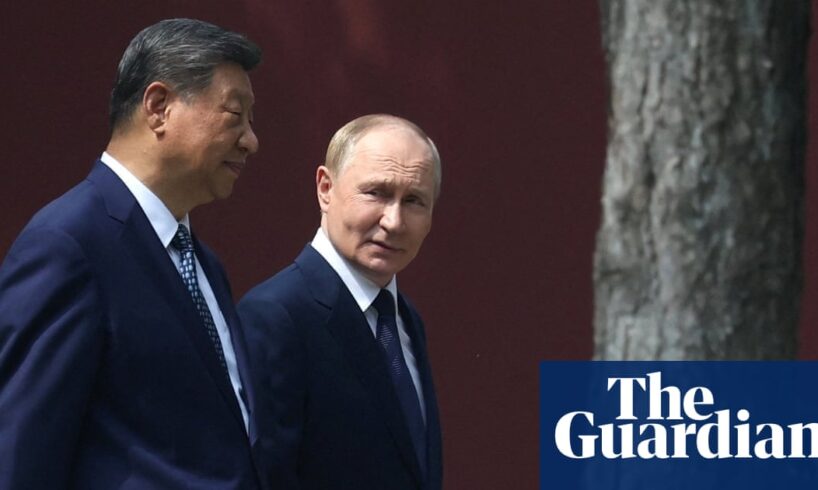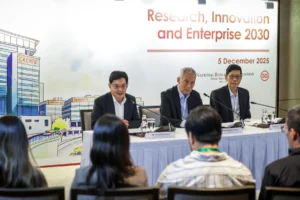
It was the stuff of Bond villains. Two ageing autocrats, their younger ally in tow, ambled down a red-carpeted ramp before a military parade in Beijing when a hot mic picked up a question that seemed to be on their minds: how long could they keep going – and, between the lines, might science allow them to rule for ever?
With advances in technology, Russia’s Vladimir Putin assured Xi Jinping via his translator that “human organs can be constantly transplanted, to the extent that people can get younger, perhaps even immortal”.
The Chinese leader replied: “By the end of this century, people may live to 150 years old.”
Nearby, North Korea’s Kim Jong-un – three decades younger than the two 72-year-olds – appeared to take note with a smile.
Beijing’s hot-mic moment has stirred gossip about the leaders’ shelf life, and inevitably, chatter about just how far they will push to keep the clock from running out.
For now, there is no sign that any of the three leaders intend to loosen their grip on power. Each looks set to rule for as long as their bodies hold out, and none has offered a clear succession plan.
Under constitutional changes he pushed through in 2020, Putin could remain in power until 2036, when he will be 83 – surpassing even Joseph Stalin’s tenure.
Xi, through purges of allies and rivals alike, has torn up the Communist party’s once-scripted tradition of grooming successors. In totalitarian North Korea, succession has traditionally been determined only by death.
The leaders’ drive for longevity is nothing new. Rulers have long searched for ways to stretch their lives and their rule.
The first emperor of China, Qin Shi Huang (259–210BC), sent expeditions to the mythical Mount Penglai in search of elixirs of eternal life – though the mercury brews he swallowed may actually have hastened his death.
Alexander the Great, legend has it, roamed the “Land of Darkness”, a mythical and perpetually dark forest, in his quest for the water of life.
Many centuries later, Italy’s Silvio Berlusconi approached the same problem with customary flamboyance – hair transplants, cosmetic surgery and blood treatments – in his attempt to appear invincible on the political stage.
Hot mic catches Putin and Xi discussing organ transplants and immortality – video
Around the same time, Nursultan Nazarbayev, Kazakhstan’s autocratic president, ordered an institute in Astana to study “rejuvenation of the organism”, the human genome and gene-based medicines.
“As for the medicine of the future, people of my age are really hoping all of this will happen as soon as possible,” Nazarbayev pleaded with local Kazakh scientists in 2010.
Berlusconi eventually died at 86, after a battle with a routine lung infection; Nazarbayev was pushed aside after unrest in Kazakhstan in 2022, his family swept from power; he is now 85.
Putin, who knew both men well, appears to be taking it further – pursuing the most ambitious and lavishly funded path toward longevity and the science of extending life.
The Russian leader has long been obsessed with health: he is said to rely on his team of doctors and turn to alternative medicine in his quest for vitality.
But those who study him say this is not just about staying healthy, it is about extending life itself.
“In his conversation with Xi, Putin spoke about a topic that genuinely interests him,” said Mikhail Rubin, a Russian journalist who recently co-authored a biography of the president.
“It’s important to understand that even at the time of this exchange, there was almost certainly a whole team of doctors somewhere nearby,” he added.
According to Rubin, there is little to indicate that Putin needs constant medical care; he appears healthy for his age, but still routinely travels with a large entourage of doctors from various specialisations.
“That suggests the Russian president is preoccupied with his health and longevity,” Rubin said.
“I believe Putin dreams of ruling for many more years, and places great hopes on the progress of modern medicine,” he added.
Putin has made little secret of his fascination with prolonging life, and on Wednesday showed no reluctance to repeat his private musings on longevity at a press conference.
“Modern means and methods of improving health, even various surgical [operations] involving organ replacement, allow humanity to hope that … life expectancy will increase significantly,” Putin told reporters in Beijing.
Mikhail Kovalchuk, a longtime family friend often described as Putin’s favourite scientist, is said to be spearheading Russia’s research into immortality.
According to the independent outlet Meduza, Kovalchuk has established several institutes with millions in state funding to invest in new technologies, including organ-printing with lab-grown cells to create replacement organs.
Putin’s eldest daughter, Maria Vorontsova, a trained endocrinologist, has also received large government grants to study extending human health and longevity, and is involved in a genetic research programme linked to Kovalchuk.
Russia’s ageing elite’s quest for eternal life has already seeped into the country’s pop culture.
It was the premise of a 2024 satirical novel by the Russian writer Ivan Filippov, Mouse, which tells the story of an infected rodent that escapes from a scientific institute where researchers are developing a drug to prolong Putin’s life
“To be honest, I wasn’t that surprised [about Putin’s hot mic comments],” Filippov told the Guardian.
“Because my story was born out of reality. And with Putin, it’s obvious: he is practically obsessed with the idea of living for ever, or at least longer than fate allows,” he said.
“In my book, this obsession ends badly for everyone,” Filippov added.
Quick GuideContact us about this storyShow
The best public interest journalism relies on first-hand accounts from people in the know.
If you have something to share on this subject you can contact us confidentially using the following methods.
Secure Messaging in the Guardian app
The Guardian app has a tool to send tips about stories. Messages are end to end encrypted and concealed within the routine activity that every Guardian mobile app performs. This prevents an observer from knowing that you are communicating with us at all, let alone what is being said.
If you don’t already have the Guardian app, download it (iOS/Android) and go to the menu. Select ‘Secure Messaging’.
SecureDrop, instant messengers, email, telephone and post
If you can safely use the tor network without being observed or monitored you can send messages and documents to the Guardian via our SecureDrop platform.
Finally, our guide at theguardian.com/tips lists several ways to contact us securely, and discusses the pros and cons of each.
Illustration: Guardian Design / Rich Cousins
Thank you for your feedback.





